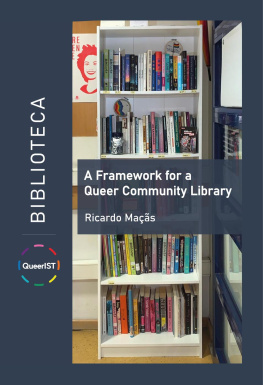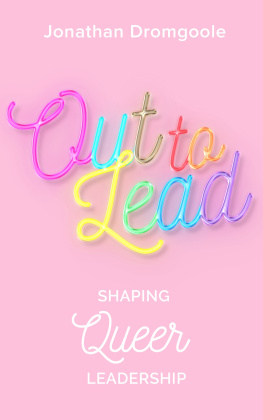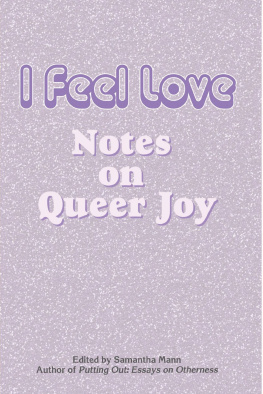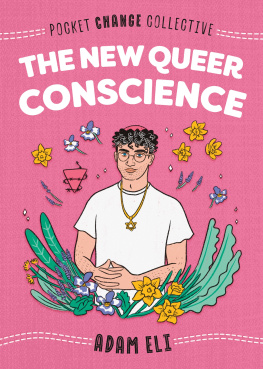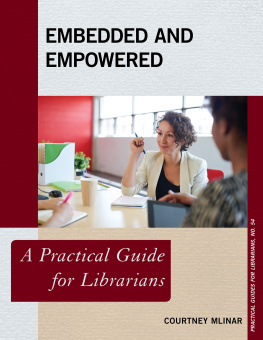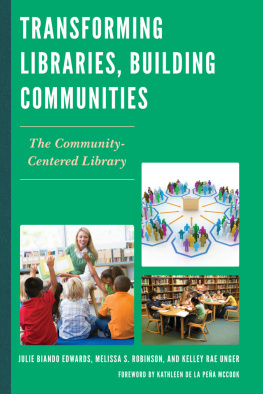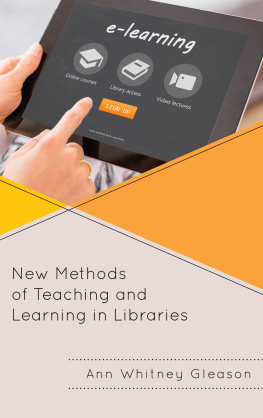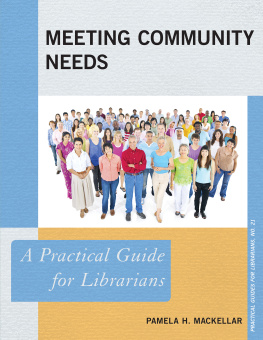A Framework for a
Queer Community Library
Written by
Ricardo Mas
Head of Library, QueerIST Library
Revised by
Joana Catarino
President, Head of Qultura, QueerIST
Clara Pereira
Founder, Former President, QueerIST
Leo
Former Vice-President, QueerIST
Filipe Maia
Consulting Librarian

QueerIST, Lisboa, 2020
Some rights reserved Alguns direitos reservados
Under license: CC Attribution NonCommercial ShareAlike 3.0 Portugal
All preceding information is required for attribution as defined in this license.
Sob licena: CC Atribuio NoComercial CompartilhaIgual 3.0 Portugal
Todos os elementos que precedem so necessrios para atribuio nos termos desta licena.
Q ueerIST is an LGBTQIA+ focused youth collective (Lesbian, Gay, Bi, Trans, Queer, Intersex, Ace people, and other sexuality and gender minorities) with the mission to promote discourse and spread information on queer topics, both to people inside and outside the queer community, fostering the inclusion of its members and working to reduce discrimination due to sexuality or gender.
QueerIST is based in Lisbon, Portugal, and it frequently organizes talks, conferences, cultural initiatives, social and recreational gatherings, all of which are open to the public. It is a student-led society out of the ISTengineering faculty in the University of Lisbon, engaging not only the local faculty but also the wider youth community in Lisbon. QueerIST is part of the organizing committee for the yearly Lisbon Pride March, and is a founding member of the Lisbons Academic Queer Action Network ( RAQUL ).
The cultural initiatives at QueerIST have included weekly curation of queer recommendations in books, films, music, and art; film showings, collaborations with the local queer film festival, production of a youth queer podcast, book sharing events, and the creation of a community-led specialized queer library, the QueerIST Library.
I n the past few years , several volunteers at QueerIST have experienced how hard it is to find and access works written by and for queer people. The lack of access was very evident, especially for younger audiences which often have no safe place to keep their queer books and no means to acquire them. Even when searching on-line, the recommendations were generally lacking in diversity, and often reduced to a few popular titles, with little to no relation with their own culture.
Realizing the importance of access to queer literature, and having organized other cultural initiatives already, the members of QueerIST took it upon themselves to create their own queer-focused library, where it would be easy and effortless to browse and find books catering to all people in the LGBTIA+ rainbow. With little funding, all the members pooled their own queer-themed books and created a catalog, structured their collection, and started lending to the public, with a very positive response.
This document will explain the foundations on which our community library is based and the guiding principles behind it. We hope that our experience in developing this project will help other collectives and institutions to successfully launch their own queer-focused libraries, and enable all people to have easier access to them, especially those who may need it the most.
I n summary, the goals of our project are:
- Improve access to queer literature, making it locally and effortlessly available to the community, both in situ and for circulation;
- Create an inclusive space where any person is comfortable to browse and enjoy the collection;
- Improve the diversity of the available queer literature, to enable people of all backgrounds, identities, and orientations to find relatable content, and to foster a common understanding between different people;
- Make queer literature more discoverable, employing the same terminology used by the LGBTIA+ community so that it can easily be found by those that want or even need it for their personal growth;
- Enable any group or collective, no matter how small or underfunded, to replicate this project, bootstrapping a library by allowing users to participate in building the collection.
1.2 Methodology and Structure
T he framework described herein is the result of a year of work at the QueerIST group by volunteers with no previous knowledge in library science. The goals of the project were set according to our own communitys perceived needs, and their execution was guided by direct feedback from the users. The shortcomings of this framework are that it likely does not follow common librarian practice, and part of it is probably echoing previous work already stated by other librarians.
This document will describe the framework we have arrived at, and coherent with our informal approach, it will regrettably lack the vocabulary, structure, and the typical number of citations that would be expected if written by a more literary source. We acknowledge that had we had more previous experience, we could have avoided rebuilding previous work or perhaps arrived at a better solution. However, in attempting to fill a latent need in our community with the resources and knowledge we had, we arrived at a well-received framework when compared to other local resources, reimagining library services from the perspective of our queer users.
This perceived success has led us to write this document, because we find many other collectives interested in following a practical approach to responding to their own communities information needs, and because some librarians have expressed interest in learning more about some of the sui generis details of our framework.
Next page
